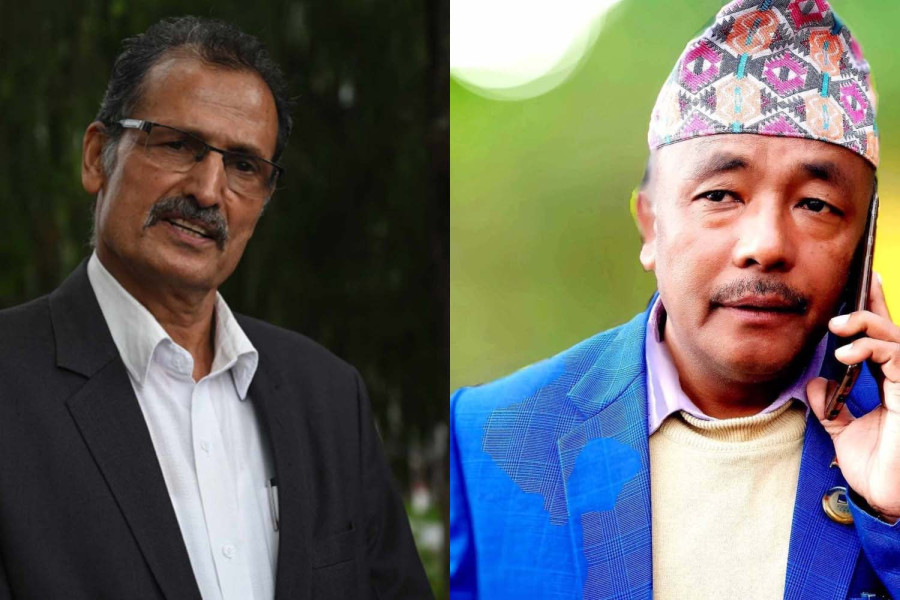Politics
Door open for murder probe against Maoist leaders Sapkota, Dong
Supreme Court directs police to investigate six people, ruling that the decision to shelve the case was flawed.
Binod Ghimire
The Supreme Court has overturned the then government’s decision to keep a murder-after-abduction case against CPN (Maoist Centre) vice-chair Agni Sapkota and party’s lawmaker Surya Man Dong in abeyance, thereby opening the door for investigation.
Issuing a verdict in the decade-old case, the top court has directed the police to carry out the investigation against six people including Sapkota and Dong, ruling that the government’s decision to shelve the case was flawed.
In July 2012, the Baburam Bhattarai Cabinet decided that the insurgency-era case of murder-after-abduction of Arjun Lama falls under transitional justice process.
Challenging the decision, Lama's wife Purnimaya, in November that year moved the Supreme Court. After postponing the hearing for around 60 times, the Constitutional Bench of the court led by Chief Justice Prakash Man Singh Raut passed the verdict in the victims' favour.
“The court has opened the door to investigate Sapkota. The police can even arrest him,” Pushpa Poudel, who advocated on Purnimaya’s behalf, told the Post. The court, however, did not release the text of the verdict on Wednesday.
Lama, 45, was attending a meeting at a local school in Dapcha in Kavrepalanchok district on April 29, 2005, when a group of CPN-Maoist combatants spirited him away, saying they wanted to talk to him about something. The rebels never let him go.
A subsequent probe by the National Human Rights Commission concluded that the Maoists had killed Lama following his abduction. His family members accused Maoist leaders Sapkota and Dong, among others, of abducting and murdering Lama.
Sapkota and Dong, however, reject the accusation. The frequent attempts of Purnimaya, Arjun’s wife, to register a first information report were turned down by the Kavrepalanchok district police, prompting her to knock the Supreme Court’s door on March 3, 2008 for its intervention in the case.
The police registered the case after the top court’s directive to immediately accept the complaint and update the top court on the proceedings every 15 days. The Kavrepalanchok district police wrote to Sindhupalchok police to locate and arrest Sapkota. But Sindhupalchok police reported that Sapkota was nowhere to be found.
Sapkota got elected to Parliament from Sindhupalchok thrice after the complaint was lodged and went on to become a Cabinet member and then the Speaker.
After submitting a few quarterly reports, the police stopped updating the court on the progress in its investigation. Meanwhile, in 2011, Sapkota was appointed the minister for information and communication. A public interest litigation was filed by a group of human rights defenders challenging his ministerial appointment. They argued that Sapkota as a minister could influence the investigation.
Although the court refused to issue an interim order against his appointment, it raised serious concerns over the lack of progress in the investigation. The court, however, said that as Sapkota was under investigation, it was up to him and his mother party to make a moral judgement on whether he should resign.
It also ordered the police to carry out the investigation effectively and independently. However, the police didn’t abide by the ruling.
The constitutional bench, however, has scrapped the petition challenging his appointment.
Four years after the petition was lodged by Purnimaya, the top court in March 2016 decided that the Constitutional Bench would henceforth hear the petitions filed by Purnimaya and civil society members. However, the hearing continued to be deferred dozens of times. Instead, Sapkota was handed over important state responsibilities despite serious objections from the victim’s family, domestic and international human rights organisations, as well as activists.
Sapkota was elected Speaker in January 2020. Although human rights activists took to the streets against the appointment, little did it affect the Maoist Centre and other parties supporting him. After the completion of his term as Speaker, the Maoist Centre is now preparing to promote him to the party’s vice-chair post.
During the hearing, the petitioner had demanded a ruling to overturn the decision to shelve the case and direct the concerned authorities to expedite investigation.
The defendant lawyers had argued that the insurgency-era case needed to be dealt with under the Truth and Reconciliation Commission.
“Establishment of transitional justice commissions doesn’t mean the victim cannot seek justice through the judicial system,” Poudel had argued. The court passed the verdict accordingly.




 10.12°C Kathmandu
10.12°C Kathmandu















